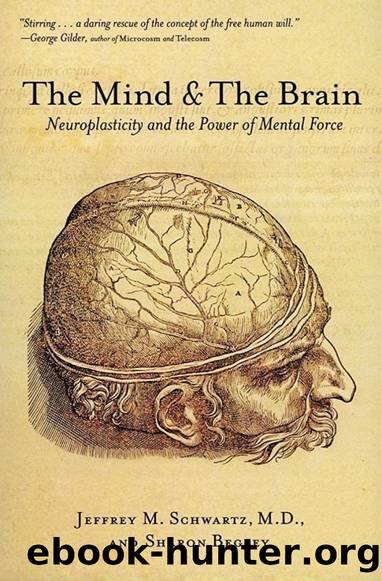The Mind and the Brain: Neuroplasticity and the Power of Mental Force by Jeffrey H. Schwartz

Author:Jeffrey H. Schwartz [Schwartz, Jeffrey H.]
Language: eng
Format: epub
ISBN: 9780060988470
Google: _4WFlwEACAAJ
Amazon: 0060988479
Barnesnoble: 0060988479
Goodreads: 3281
Publisher: Regan Books
Published: 2002-01-02T00:00:00+00:00
The motor cortex, youâll recall, is arranged like a little homunculus. But it is hardly a static layout. From day to day and even moment to moment, the motor cortex map changes, reflecting the kinds of movements it controls. Complex movements result in outputs from the motor cortex that strengthen some synapses and weaken others, producing enduring changes in synaptic strength that result in those things we call motor skills. Learning to ride a bicycle is possible, in all likelihood, not merely because of something called muscle memory but also because of motor-cortex memory.
In 1995, Alvaro Pascual-Leone, following up on his Braille study, conducted an experiment that, to me, has not received nearly the attention it deserves. This one modest study serves as the bridge between the experiments on humans and monkeys showing that changes in sensory input change the brain, on the one hand, and my discovery that OCD patients can, by changing the way they think about their thoughts, also change their brain. What Pascual-Leone did was have one group of volunteers practice a five-finger piano exercise, and a comparable group merely think about practicing it. They focused on each finger movement in turn, essentially playing the simple piece in their heads, one note at a time. Actual physical practice produced changes in each volunteerâs motor cortex, as expected. But so did mere mental rehearsal, and to the same degree as that brought about by physical practice. Motor circuits become active during pure mental imagery. Like actual, physical movements, imagined movements trigger synaptic change at the cortical level. Merely thinking about moving produced brain changes comparable to those triggered by actually moving.
These were the opening shots in what would be a revolution in our understanding of the origins of human disabilities as diverse as focal hand dystonia, dyslexia, and cerebral palsy. Merzenich firmly believed that the focus of the previous two decadesâattributing neurological illness (especially developmental abnormalities) primarily to molecular, genetic, or physical defectsâhad missed the boat. Instead, he suspected, it is the brainâs essential capacity for changeâneuroplasticityâthat leaves the brain vulnerable to such disabilities. But if that is true, Merzenich persisted, surely the reverse would hold as well: if neuroplasticity opens the door to disabilities, then maybe it can be harnessed to reverse them, tooâjust as it reversed the âerrorsâ caused by the ministroke in the food-pellet-retrieving monkeys. Just as a few thousand practice trials at retrieving pellets resulted in a new brain that supported a new skill in the monkeys, so, too, might several thousand âtrialsâ consisting of hearing spoken language imperfectly, or playing the same piano notes over and over, result in a new brainâand possibly a new impairmentâin people. The brain changes causing these impairments could become so severe that Merzenich coined a term to capture their magnitude: learning-based representational catastrophe, as he characterized it to a scientific meeting in the late fall of 2000.
If an increased cortical representation of the fingering hand of string players, and a strengthening of motor circuits in the
Download
This site does not store any files on its server. We only index and link to content provided by other sites. Please contact the content providers to delete copyright contents if any and email us, we'll remove relevant links or contents immediately.
The Art of Thinking Clearly by Rolf Dobelli(10455)
The 5 Love Languages: The Secret to Love That Lasts by Gary Chapman(9792)
Mindhunter: Inside the FBI's Elite Serial Crime Unit by John E. Douglas & Mark Olshaker(9324)
Becoming Supernatural by Dr. Joe Dispenza(8204)
Nudge - Improving Decisions about Health, Wealth, and Happiness by Thaler Sunstein(7693)
The Road Less Traveled by M. Scott Peck(7594)
Mastermind: How to Think Like Sherlock Holmes by Maria Konnikova(7323)
Enlightenment Now: The Case for Reason, Science, Humanism, and Progress by Steven Pinker(7306)
Win Bigly by Scott Adams(7184)
The Way of Zen by Alan W. Watts(6601)
Factfulness: Ten Reasons We're Wrong About the World – and Why Things Are Better Than You Think by Hans Rosling(4736)
The State of Affairs by Esther Perel(4712)
Gerald's Game by Stephen King(4642)
Man's Search for Meaning by Viktor Frankl(4585)
The Confidence Code by Katty Kay(4251)
Thinking in Bets by Annie Duke(4218)
The Healing Self by Deepak Chopra(3568)
Hidden Persuasion: 33 psychological influence techniques in advertising by Marc Andrews & Matthijs van Leeuwen & Rick van Baaren(3558)
The Worm at the Core by Sheldon Solomon(3486)
